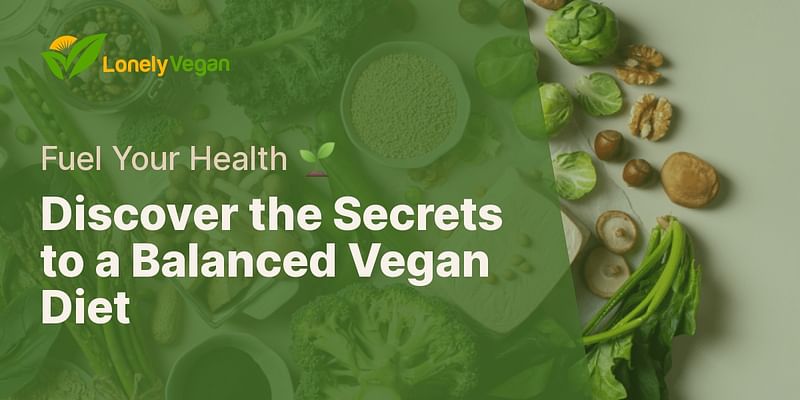Oliver Reed is a professional chef and a vegan food critic. He brings his culinary expertise to Lonely Vegan by reviewing vegan restaurants and sharing his gourmet vegan recipes. Oliver's mission is to prove that vegan food can be just as delicious and diverse as any other cuisine.
Hey there! I'm Oliver Reed, and I'm here to help you navigate the world of veganism and maintain a healthy and balanced diet without meat or dairy. Going vegan doesn't mean sacrificing your health or missing out on essential nutrients. In fact, with a little bit of knowledge and planning, you can thrive on a plant-based diet. Let's dive in!
First things first, it's important to understand that a balanced vegan diet consists of a variety of whole foods. This means incorporating plenty of fruits, vegetables, whole grains, legumes, nuts, and seeds into your meals. These foods provide a wide range of vitamins, minerals, and antioxidants that are essential for your overall health.
To ensure you're getting all the necessary nutrients, let's break it down:
1. Protein: Contrary to popular belief, it's entirely possible to get enough protein on a vegan diet. Plant-based protein sources include legumes (like lentils, chickpeas, and black beans), tofu, tempeh, seitan, quinoa, and hemp seeds. Incorporating a variety of these protein-rich foods into your meals will ensure you meet your daily protein needs.
2. Calcium: Dairy isn't the only source of calcium! You can find this essential mineral in plant-based foods such as kale, broccoli, bok choy, fortified plant-based milk (like almond or soy milk), tofu, and sesame seeds. Including these calcium-rich foods in your diet will help support healthy bones and teeth.
3. Vitamin B12: This vitamin is primarily found in animal products, so it's important for vegans to supplement it. You can find vegan-friendly B12 supplements in the form of pills, sprays, or even fortified foods like plant-based milk or cereals. Including these supplements in your routine will ensure you're meeting your B12 needs.
4. Omega-3 fatty acids: These healthy fats are essential for brain health and can be found in flaxseeds, chia seeds, hemp seeds, walnuts, and algae-based supplements. Incorporating these sources into your diet will help you meet your omega-3 needs.
5. Iron: Plant-based iron sources include lentils, tofu, spinach, quinoa, and fortified cereals. Pairing these iron-rich foods with vitamin C-rich foods (like citrus fruits or bell peppers) can enhance iron absorption.
6. Vitamin D: While sunlight is the best source of vitamin D, it can be challenging to get enough, especially during the winter months. Consider taking a vegan vitamin D3 supplement to ensure you're meeting your needs.
Now that we've covered the essential nutrients, let's talk about meal planning. Planning your meals in advance can help you stay on track and ensure you're getting a variety of nutrients. Start by creating a weekly meal plan and make sure to include a mix of whole grains, legumes, fruits, vegetables, and plant-based proteins. This will help you avoid falling into a rut and keep your taste buds excited.
Experimenting with new recipes and flavors is also a great way to stay motivated and enjoy your vegan journey. There are countless vegan recipe websites, cookbooks, and blogs out there that offer delicious and nutritious plant-based meal ideas. Don't be afraid to get creative in the kitchen and try new ingredients!
Lastly, if you're concerned about meeting your nutritional needs, it's always a good idea to consult with a registered dietitian who specializes in vegan nutrition. They can provide personalized guidance and ensure you're on the right track.
Remember, going vegan is not only beneficial for your health but also for the environment and animal welfare. With a little bit of planning and knowledge, you can maintain a healthy and balanced vegan diet that nourishes both your body and soul.
Stay passionate, stay healthy, and enjoy your vegan journey!











